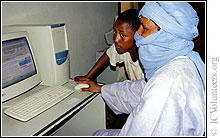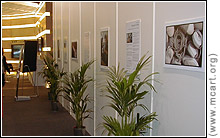WSIS Volunteer Family, Phase 1 Report
Intro | Context | Case Studies | Action Plan | Docs | Recommendations | Partners | Links
Context
Background
World Summit on the Information Society (WSIS)
The World Summit on the Information Society (WSIS) — Geneva 2003 and Tunis 2005 —provides an opportunity to discuss issues raised by the emergence and current development of the Information Society.
As the industrial society of the 20th century rapidly gives way to the information society of the 21st century, fundamental changes impact all aspects of our lives, including knowledge dissemination, social interaction, economic and business practices, political commitment, media, education, health, leisure and entertainment.
The Geneva phase brought together 13,000 participants, including 44 Heads of State, Prime Ministers, Presidents, Vice-Presidents and 83 Ministers and Vice-Ministers from 176 countries. More than just another technical meeting, it incorporates two innovative aspects: (1) it is a multi-actor Summit, including governments, civil society, the private sector, UN agencies and media; (2) it is being held in two phases (Geneva 2003, Tunis 2005).
For more information, see the official web site of the WSIS.
Civil Society Mechanisms for the WSIS
New and innovative mechanisms have been developed to facilitate the participation of civil society in the WSIS. The civil society structure is organized into three main entities: 1) the Plenary, 2) Contents and Themes Caucuses and Working Groups, 3) the International Civil Society Bureau.
The Plenary is the supreme entity, bringing together all civil society
organizations participating in the process.
The Contents and Themes Caucuses develop language about specific issues and
topics to be integrated into the official WSIS documents (for Phase 1,
Declaration of Principles, Plan of Action and Civil Society Declaration).
The International Civil Society Bureau (CSB) was created to facilitate the participation of civil society in the Summit and deals with procedural issues related to this participation. The CSB is comprised of 22 “Families”, organized around interest groups and regions.
One such group is the Volunteer Family. The latter also has been active at the contents and themes level, through the Working Group on Volunteering and ICTs.
The Volunteer Family
Who?

The “Volunteer Family” brings together organizations working with volunteers both locally and at an international level, as well as volunteers themselves. Its aim is to provide a two-way channel to bring input from volunteer organizations and volunteers working with new technologies to the World Summit on the Information Society and vice versa.
The Family includes the following organizations: ATD Quart Monde, CIVICUS (World Alliance for Citizen Participation), the European Volunteer Center (CEV), Fundació de la Solidaritat i el Voluntariat de la Comunitat Valenciana (Spain), International Association for Volunteer Effort (IAVE), International Conference Volunteers (ICVolunteers) and the International Federation of Red Cross and Red Crescent Societies (IFRC). Thoughout the entire first phase of the WSIS, it closely collaborated with the United Nations Volunteers Programme (UNV). To date, ICVolunteers has served as the Focal Point of the WSIS Volunteer Family.
Activities
For the first phase of the Summit, activities of the Volunteer Family included:
- Creation of a Working Group on Volunteering and ICTs, which produced a series of documents and a Plan of Action 2003-2005, presented to the WSIS Governmental Plenary on 12 December 2003 in Geneva (Switzerland).
- Work to include the notion of volunteerism and solidarity in official texts of the Summit (Declaration of Principles, Plan of Action and Civil Society Declaration).
- Creation of an online library on “Volunteerism and Information Society” (www.worldwidevolunteer.org).
- Creation of a working group for a scientific study on the means to reduce the digital divide.
- Organization of several meetings and conferences.
- WSIS European Meeting, European Volunteer Centre, Brussels (Belgium), 10 October 2003, organized by CEV.
- International Symposium on Volunteering and the Development of Human Capacity in the Information Society in Dakar (Senegal), 23 to 25 October 2003, organized by ICVolunteers.
- IAVE Board Meeting, Edinburgh (Scotland), 28 November 2003, organized by IAVE.
- Conference on Volunteering and ICTs, Summit Event, Geneva (Switzerland), 7 to 8 December 2003, organized by ICVolunteers and IAVE.
- Creation of multimedia components , including:
- A documentary film titled “Something out of Nothing”, an inquiry on the role of the Internet in Senegal and Mali and the lessons that can be learned from it. The film was first shown at the Conference on Volunteering and ICTs on 7 December 2003 and the Cyberfestival of local contents at Forum de Meyrin in Geneva on 9 December 2003.
- A photo exhibition under the title “Something out of Nothing”, Volunteerism and the Information Society, Crossroads between the North and the South”, illustrating the digital divide in a concrete manner. The exhibition brought together ten artists from Europe, Africa and America who showed some 80 photographs taken in Europe, Africa and Asia at the ICT4D Platform in Geneva. The exhibition will continue to be shown in different places around the world.
Event Overview
WSIS European Meeting, CEV (Brussels, Belgium)
Organized on 10 October 2003 by the European Volunteer Centre, the meeting brought together representatives from the volunteer sector from Belgium, the Czech Republic, England, Germany, the Netherlands, Romania, Scotland, Spain and Switzerland. They discussed ICTs and Volunteerism in Europe, focusing on a volunteer and volunteer coordinator perspective.
This first major meeting of volunteer organizations in the WSIS process was important in identifying some of the key issues to be included in further discussions.
Results:
Participants in particular recommended to:
- Stress the importance of capacity building through volunteering;
- Enhance cross-sectorial resource sharing and private sector involvement, under the auspices of corporate responsibility programs. The aim is to encourage businesses to take responsibility, rather than solely seeing their action as a profit-making investment. This has important implications for the sustainability of results and organizations;
- Promote corporate volunteer programs. This includes two major aspects: (1) employees of the corporate sector may offer their time and skills as corporate volunteers for ICT projects, (2) high-tech companies may offer internships, providing opportunities to young people;
- Raise awareness among governments that volunteers are key in the delivery of their social objectives. The aim is not to replace professional services with volunteer services, but to fill gaps where professional services do not exist. It is therefore in the inerest of governments to empower volunteer organizations by helping them get access to ICTs.
Click here to read the full summary of the meeting.
International Symposium on Volunteering and the Development of Human Capacity in the Information Society (Dakar, Senegal)
After PrepCom 2 of the WSIS, it became clear that there was a need to develop models for the implementation of the declarations and action plans brought forward in the Summit process. It is in this context that the Volunteer Family held the International Symposium on Volunteerism and the Development of Human Capacity in the Information Society from 23 to 25 October 2003 in Dakar, Senegal.
Organized by ICVolunteers, the three-day Symposium was an opportunity for participants to look at the mobilization of volunteers for projects linked to ICTs, with respect to five specific aspects: (1) infrastructure, (2) training, (3) development of contents, (4) partnerships and financing and (5) institutional framework.
The Conference brought together 165 participants from 25 countries from Africa, Europe, the Americas and Asia. Among these were representatives from governments, civil society, the private sector and the media.
Many of them presented their ICT-Volunteer Projects. There was a particular focus on the reinforcement of collaboration and partnerships, both at a national and international level. The ultimate goal of the discussions was not only to tackle the “digital divide” between the North and the South, but maybe even more so the one that separates urban zones and rural ones.
Results:
The main result of the Symposium is the Message of Dakar, a series of
recommendations made by participants.
Conference on Volunteering and ICTs, Summit Event, Geneva (Switzerland)
As part of the World Summit itself, international leaders of volunteer
organizations participated in the Conference on Volunteering and ICTs, held from
7 to 8 December at Palexpo in Geneva (Switzerland).
Building on the results of the Dakar Symposium, the Conference focused on human
capacity building, e-volunteering and the mobilization of volunteers for ICT
projects.
The participants discussed concrete strategies to help volunteer organizations meet the new challenges of the information society. The Conference was the main platform of exchange for the volunteer sector during the WSIS itself.
If one was to name a single theme that was most emphasized during the event, it is that technology alone is not enough in the developing world. Instead, it is a combination of capacity building, literacy programs and technology. Also, as Kumi Naidoo of CIVICUS pointed out, the work of volunteers needs to be seen at several levels: the macro-level (governance), mezzo-level (policy) and micro-level (operational).
Presenters from a local government, as well as NGO and private sector organizations presented examples of successful partnerships between the volunteer sector and other sectors.
Results:
Participants finalized the Volunteer Action Plan to be implemented between 2003
and 2005.
Photo Exhibition: “Something out of Nothing”
 Volunteerism and the Information Society, Crossroads between the North and
the South…
Volunteerism and the Information Society, Crossroads between the North and
the South…
The exhibition “Something out of Nothing” provided a concrete illustration of the digital divide. The exhibition shows photographs by ten volunteer photographers from Africa, Asia and Europe. Photographers explored how communities integrate imported technology (computers, mobile phones, television, radio) into their own cultures. The goal was to try to capture inventive ways people are exchanging, patching together, recycling and even bartering technologies around the world.
Through their images, the various photographers take us with them on their travels and wanderings to explore exchanges between the North and the South.
The exhibition amalgamates divers perspectives of how "volunteering" relates to new information and communication technologies and makeshift craftsmanship and recycling. Telephone lines being rebuilt for free, computers being used as coffee tables, a singe portable telephone being shared by a whole village…
The multi-cultural group of photographers shares this exploration, allowing each photographer to develop his or her own view; starting from here and going there, or starting there and coming here. For example: Sheba Okwenje, an African living in Europe, went back to her home country, Uganda, to focus on mobile telephone technology powered by solar energy. Paola Cassola, an Italian living in Geneva, developed the theme of literacy and computer literacy of immigrants, thanks to classes taught by volunteers. Randy Schmieder showed that at the end of the day, the usefulness of technologies depends on by whom they are being used. Pascale Linares, French by origin, but a citizen of the world through her many experiences around the planet, explored through her photography the theme of volunteering and the new information technologies in the Cape Verde Islands. Steve Szoradi worked on the theme of recycling of computers to be sent to Africa. There is a particular focus on Mali, where two European photographers –Patrice Moullet and Viola Krebs— and two Malian photographers Emmanuel Bacary Daou and Mamadou Konaté—exchanged views linked to the contrast between technology and tradition, mutual help and solidarity.